Ferdinand Berthier: Pioneer of Deaf Education and Advocacy

Did you know that nearly 5% of the global population—over 430 million people—experience significant hearing impairment? This emphasizes the pivotal role of Ferdinand Berthier’s contributions. As a French educator, Berthier was a key figure in championing the rights and education of the deaf community in the 19th century.
Being deaf himself, Berthier was acutely aware of the challenges faced by those with hearing loss. He was committed to dismantling the barriers that restricted access to education and equal opportunities. His revolutionary teaching methods and tireless advocacy reshaped deaf education, leaving an enduring legacy in its history.
Read more: Aiden Langston Utah: Rising Star in the Making

Foreword
Ferdinand Berthier: Pioneer of Deaf Education was a beacon of light for the deaf community in the 19th century. He dedicated his life to improving the education and social standing of deaf individuals. This section will delve into his significant role and contributions to deaf education.
Who Was Ferdinand Berthier?
Ferdinand Berthier was born on September 30, 1803, in Louhans, France. He lost his hearing early, which led him to attend the renowned Institution Nationale des Sourds-Muets in Paris. He was profoundly influenced by his teacher, Abbé de l’Épée, a notable figure in deaf education.
He became a teacher at the same institution, where he taught for many years. Berthier was a passionate advocate for the rights of deaf people. He organized the first banquets for the deaf community, fostering a sense of unity and identity among deaf individuals.
Berthier’s efforts extended beyond teaching. He was an author and historian, who documented the lives of early deaf education pioneers. His works serve as valuable resources for understanding deaf community history. Below is a table summarizing key aspects of his life:
| Aspect | Details |
|---|---|
| Birthdate | September 30, 1803 |
| Birthplace | Louhans, France |
| Profession | Teacher, Author, Historian |
| Influence | Abbé de l’Épée |
Why Is He Considered A Pioneer In Deaf Education?
Ferdinand Berthier is considered a pioneer in deaf education for several reasons. He was one of the first deaf individuals to become a teacher of the deaf, breaking barriers and setting a precedent for others to follow. He believed in the potential of deaf individuals and worked tirelessly to ensure they received quality education.
Berthier’s advocacy for the deaf community was unparalleled. He organized the first banquets for the deaf, creating a platform for deaf individuals to come together and celebrate their identity. These gatherings were crucial in building a sense of community and solidarity among deaf people.
He also played a significant role in documenting the history of early deaf education pioneers. His writings provide invaluable insights into the lives and contributions of these pioneers. Berthier’s works are still referenced today by scholars studying the history of the deaf community.
In summary, Ferdinand Berthier’s contributions to deaf education were multifaceted. He was a teacher, advocate, historian, and community organizer. His legacy continues to inspire and influence the field of deaf education.
Early Life And Personal Background
Ferdinand Berthier was a trailblazer in the field of deaf education. He made groundbreaking contributions that changed the lives of many. Delving into Ferdinand Berthier’s early life and personal background helps us understand his journey and commitment. His story offers a glimpse into the history of French deaf education and the world of deaf education in 19th-century France.
Birth And Early Life
Ferdinand Berthier was born on September 30, 1803, in Louhans, France. His early life was characterized by both challenges and resilience. Growing up in an era with minimal understanding of deafness, he faced significant obstacles. While his parents were supportive, they had limited resources and knowledge to aid his development.
In the small town of Louhans, situated in eastern France, Ferdinand spent his formative years. Despite these difficulties, he exhibited a remarkable capacity to adapt. However, the rural environment offered few opportunities for specialized education.
Some key points about Ferdinand Berthier’s early life:
- Birth Date: September 30, 1803
- Birth Place: Louhans, France
- Family Background: Supportive but lacked knowledge about deafness
- Early Challenges: Limited resources and opportunities
Ferdinand’s early experiences shaped his determination to change the status quo. His resilience and curiosity were evident from a young age. These traits would later fuel his passion for deaf education.
Also See: Andre Hakka – wife, house, and net worth Story
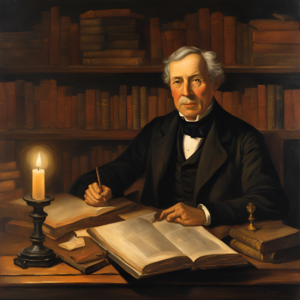
Education And First Encounters With Deaf Culture
Ferdinand Berthier’s education began uniquely. At the age of 8, he was enrolled at the Institut National de Jeunes Sourds in Paris. This institution was a pioneering school for the deaf, founded by the famous Abbé de l’Épée.
Berthier’s first encounters with deaf culture happened here. He met other deaf students and learned from educators who understood their needs. These experiences were transformative for young Ferdinand.
Key aspects of his education and early experiences:
- Institution: Institut National de Jeunes Sourds
- Age of Enrollment: 8 years old
- Influential Figures: Abbé de l’Épée and other educators
- First Encounters with Deaf Culture: Met other deaf students, learned sign language
During his time at the institute, Ferdinand excelled academically. He showed a keen interest in learning and quickly grasped complex concepts. His interactions with peers and educators enriched his understanding of deaf culture.
Ferdinand Berthier’s early education laid the foundation for his future endeavors. His experiences at the Institut National de Jeunes Sourds were instrumental in shaping his vision. He would go on to become a pivotal figure in the history of French deaf education.
Deaf Education Before Ferdinand Berthier
Before Ferdinand Berthier became a pioneer of deaf education, the landscape of teaching the deaf was quite different. His work in the 19th century revolutionized how society viewed and educated the deaf. Let’s explore the context of deaf education before Ferdinand Berthier.
Historical Overview Of Deaf Education
The history of deaf education dates back centuries. Initially, deaf individuals faced significant social and educational challenges. During the early periods, they were often marginalized and excluded from mainstream society.
In the 16th century, Pedro Ponce de León, a Spanish monk, created one of the first documented methods for educating the deaf. He used a combination of sign language and oral methods to teach his students. This early attempt laid the groundwork for future advancements in deaf education.
By the 18th century, Abbé de l’Épée, a French priest, furthered the cause. He established the first public school for the deaf in Paris. Abbé de l’Épée developed a system of standardized signs, which became a precursor to modern sign language. He believed that deaf individuals could be educated just as well as those who could hear.
In the 19th century, before Ferdinand Berthier’s influence, education for the deaf was still evolving. Various methods were being experimented with, including:
- Manualism: Using hand signs and gestures to communicate.
- Oralism: Encouraging deaf individuals to use speech and lip-reading.
- Combined Method: A mix of manual and oral techniques.
Despite these efforts, many deaf individuals struggled to receive a quality education. The lack of standardized practices and trained educators hindered their progress.
International Comparison: Deaf Education In Other Countries
During the 19th century, global deaf education trends varied widely. Different countries adopted different approaches to teaching the deaf. Here’s a comparison of deaf education in several countries:
| Country | Approach to Deaf Education |
|---|---|
| France | Manualism, influenced by Abbé de l’Épée’s sign language methods |
| Germany | Oralism, focusing on speech and lip-reading |
| United States | Combined Method, incorporating both sign language and oral techniques |
| Spain | Early adoption of sign language methods by Pedro Ponce de León |
In France, the influence of Abbé de l’Épée was significant. His standardized signs became widely used. In Germany, the oral method dominated. Educators believed that teaching deaf individuals to speak would integrate them better into society. In the United States, a combined approach was popular. Schools used both sign language and oral methods to teach their students.
Each country’s approach had its strengths and weaknesses. The lack of a unified method made it challenging for deaf individuals to receive consistent education. This inconsistency highlighted the need for pioneers like Ferdinand Berthier, who sought to improve and standardize deaf education.
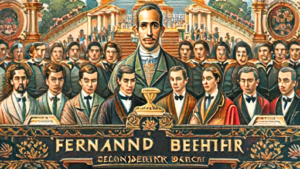
Ferdinand Berthier’s Work At The Institute For Deaf-mutes In Paris
Ferdinand Berthier’s work at the Institute for Deaf-Mutes in Paris marked a significant advancement in deaf education. His dedication and passion revolutionized how deaf individuals were taught and integrated into society. Berthier’s contributions continue to influence modern teaching methods and policies.
The Paris Institute: Background And Importance
The Institute for Deaf-Mutes in Paris, founded in 1760, was one of the first schools dedicated to the education of deaf individuals. It quickly became a beacon of hope and a symbol of progress for the deaf community.
Berthier joined the institute in the early 19th century and became a prominent figure due to his revolutionary ideas and methods. His work at the institute was crucial for several reasons:
- Advocacy for Deaf Rights: Berthier advocated for the rights and recognition of deaf individuals.
- Promotion of French Sign Language: He emphasized the importance of French Sign Language as a vital tool for communication and education.
- Development of Curriculum: Berthier contributed to the development of a comprehensive curriculum tailored to the needs of deaf students.
In addition to his teaching responsibilities, Berthier organized social and cultural events that helped integrate the deaf community into broader society. His efforts laid the foundation for many modern deaf education practices.
Innovations In Teaching
Berthier introduced several teaching innovations in deaf education that transformed how deaf students learned. He believed in the power of French Sign Language over the prevailing oralist methods, which focused on lip-reading and speech.
Some of his key innovations included:
- Sign Language Integration: Berthier integrated sign language into the curriculum, allowing students to learn more naturally and effectively.
- Visual Learning Aids: He used visual aids and gestures to enhance understanding, making lessons more engaging and accessible.
- Peer Learning: Berthier encouraged peer learning, where students taught each other, fostering a collaborative and supportive environment.
Berthier’s emphasis on sign language over oralism sparked significant debates in the education community. His methods proved that sign language could be an effective and empowering means of instruction for the deaf.
Under Berthier’s guidance, the Institute for Deaf Mutes became a model institution that inspired similar schools worldwide. His legacy lives on in the continued advocacy for sign language and the development of inclusive educational practices.
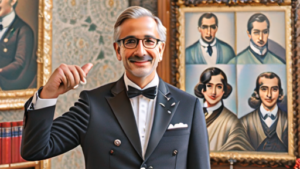
Ferdinand Berthier’s Role As An Advocate For The Deaf Community
Ferdinand Berthier was a true pioneer in deaf education. He dedicated his life to improving the lives of the deaf community. Berthier’s role as an advocate for the deaf was groundbreaking. He fought tirelessly for their rights and recognition. His efforts laid the foundation for many advancements in deaf education and advocacy.
Advocacy For Deaf Rights
Ferdinand Berthier was a champion for deaf rights advocacy. He believed that deaf individuals deserved the same rights as hearing people. He fought against discrimination and worked to ensure that deaf people had access to education and employment.
Berthier’s advocacy included:
- Establishing schools for the deaf to provide quality education.
- Writing articles and books to raise awareness about deaf issues.
- Lobbying for laws that protected the rights of deaf individuals.
He also believed in the importance of deaf culture and identity. Berthier emphasized the use of sign language in education. He argued that sign language was a natural way for deaf people to communicate and learn.
His efforts helped to change public perceptions of deafness. People began to see deaf individuals as capable and intelligent. Berthier’s work in deaf rights advocacy had a lasting impact on the deaf community.
Deaf Congresses And Leadership
Ferdinand Berthier played a key role in organizing international deaf congresses. These congresses brought together deaf individuals from around the world. They provided a platform for sharing ideas and experiences.
Berthier’s leadership in these congresses helped to unite the deaf community. He encouraged collaboration and mutual support. These events were crucial in the history of deaf organizations.
Some notable congresses that Berthier was involved in:
| Year | Location | Significance |
|---|---|---|
| 1834 | Paris, France | First international meeting of deaf educators |
| 1851 | London, UK | Promoted international cooperation in deaf education |
Berthier’s leadership in deaf communities extended beyond these congresses. He mentored many young deaf leaders and encouraged them to advocate for their rights. His influence helped to create a new generation of deaf activists.
Ferdinand Berthier’s contributions to the deaf community are still felt today. His work in advocacy and leadership has inspired countless individuals. Berthier’s legacy continues to shape the future of deaf education and rights.

Contributions To French Sign Language (LSF) And Deaf Culture
Ferdinand Berthier was a true pioneer in Deaf education. His work significantly contributed to the development of French Sign Language (LSF) and Deaf culture. Berthier’s efforts in promoting and preserving LSF and his contributions to Deaf identity have left a lasting legacy.
Promotion Of French Sign Language (also)
Berthier played a crucial role in the history of French Sign Language. He understood the importance of a unified sign language for the Deaf community. His efforts in promoting LSF were multifaceted:
- Educational Reforms: Berthier advocated for the use of LSF in Deaf schools. He believed that using a common sign language would improve the quality of education for Deaf students.
- Public Awareness: Berthier organized public demonstrations to showcase LSF. These events helped raise awareness and acceptance of sign language among hearing individuals.
- Literature and Publications: Berthier wrote extensively about LSF. His works provided valuable resources for both Deaf and hearing people interested in learning the language.
Berthier’s commitment to LSF also included efforts to preserve sign language during the rise of the oralism movement. This movement aimed to suppress sign language in favor of teaching Deaf individuals to speak and read lips. Berthier opposed this, advocating instead for the natural use of sign language within the Deaf community.
Here is a table summarizing his main contributions to LSF:
| Contribution | Impact |
|---|---|
| Educational Reforms | Improved quality of Deaf education |
| Public Awareness | Increased acceptance of LSF |
| Literature and Publications | Provided resources for LSF learners |
Cultural Contributions To Deaf Identity
Berthier’s influence extended beyond language. He was a key figure in shaping Deaf cultural identity. His cultural contributions included:
- Organizing Social Events: Berthier organized events where Deaf individuals could gather. These gatherings strengthened community bonds and fostered a sense of belonging.
- Advocacy for Deaf Rights: Berthier was a vocal advocate for the rights of Deaf people. He fought for their recognition and inclusion in society.
- Promoting Deaf Art and Literature: Berthier encouraged Deaf artists and writers. He believed in the importance of Deaf people expressing their experiences and culture through art.
Berthier’s efforts in promoting a strong Deaf identity helped counteract the negative effects of the oralism movement. By advocating for the use of LSF and supporting Deaf culture, he laid the groundwork for a resilient and vibrant Deaf community. His legacy continues to inspire Deaf individuals to take pride in their language and culture.
Today, Berthier is remembered as a champion of Deaf cultural identity. His work continues to influence the modern Deaf community, ensuring that French Sign Language history and culture remain vibrant and respected.

Ferdinand Berthier’s Publications And Academic Work
Ferdinand Berthier was a pioneer in the field of deaf education. His work has had a lasting impact on the academic community. Ferdinand Berthier’s publications and academic work remain highly influential today. He contributed significantly to the education of the deaf, and his writings provide valuable insights into this field.
Books And Essays On Deaf Education
Ferdinand Berthier authored numerous books and essays on deaf education. His works have educated many about the needs and abilities of deaf individuals. Berthier’s publications include:
- “The Education of Deaf-Mutes”
- “On the Instruction of the Deaf and Dumb”
- “Memoirs on Deaf Education”
These deaf education publications emphasized the importance of specialized teaching methods. Berthier’s writings often highlighted the need for deaf individuals to receive education in sign language. He argued that sign language was crucial for the cognitive development of deaf children. His books also discussed the social integration of deaf individuals.
Berthier’s essays often reflected his personal experiences as a deaf individual. He used his own life as a case study to illustrate the challenges and successes in the education of the deaf. This personal touch made his writings relatable and impactful.
Below is a table summarizing some of his most influential works:
| Title | Publication Year | Key Topics |
|---|---|---|
| The Education of Deaf-Mutes | 1834 | Educational Methods, Sign Language |
| On the Instruction of the Deaf and Dumb | 1840 | Instruction Techniques, Cognitive Development |
| Memoirs on Deaf Education | 1848 | Personal Experiences, Social Integration |
Academic Influence And Thought Leadership
Berthier’s academic influence on deaf studies cannot be overstated. He was a thought leader who shaped the field of deaf education. His work has left an indelible mark on both academic and practical approaches to teaching the deaf.
Berthier’s ideas were groundbreaking. He advocated for the use of sign language in education, which was a revolutionary concept at the time. His writings influenced many educators and researchers. They adopted his methods and principles in their work.
Berthier also played a crucial role in the establishment of institutions for the deaf. He was involved in the founding of several schools and organizations. These institutions provided education and support for deaf individuals. His leadership in these initiatives showcased his commitment to the cause.
Berthier’s thought leadership extended beyond his publications. He was an active participant in academic circles. He often engaged in debates and discussions about the best practices in deaf education. His contributions to these discussions helped shape the direction of the field.
In summary, Ferdinand Berthier’s academic influence on deaf studies and his thought leadership have had a profound impact. His work continues to inspire and guide educators and researchers in the field of deaf education.
Berthier’s Impact On Modern Deaf Education And Beyond
Ferdinand Berthier was a true pioneer in the field of deaf education. His impact on modern deaf education and beyond is profound. Berthier’s work laid the foundation for many educational practices we see today. Understanding his contributions helps us appreciate the progress in the field of deaf education.
Lasting Impact On Deaf Education
Berthier’s impact on modern deaf education is immense. He advocated for the rights of the deaf community and emphasized the importance of sign language. Berthier believed that deaf individuals should have the same educational opportunities as hearing individuals.
Some key contributions include:
- Promotion of Sign Language: Berthier was a strong proponent of using sign language in education.
- Establishment of Institutions: He helped establish schools for the deaf, providing structured education.
- Community Building: Berthier worked to create a sense of community among deaf individuals.
Berthier’s work led to the development of specialized teaching methods. These methods are still used in modern deaf education. His advocacy also helped in gaining recognition for sign language as a legitimate language.
Below is a table summarizing his key contributions:
| Contribution | Impact |
|---|---|
| Promotion of Sign Language | Enhanced communication and learning for the deaf |
| Establishment of Institutions | Provided formal education to many deaf individuals |
| Community Building | Fostered a supportive environment for the deaf |
Global Influence And Recognition
Berthier’s influence extended far beyond his local community. His work garnered global recognition, inspiring other deaf education pioneers around the world. The legacy of Ferdinand Berthier is evident in various international initiatives and policies.
Key points of his global influence include:
- International Advocacy: Berthier was involved in international conferences, promoting deaf education.
- Influence on Policy: His ideas influenced policies in various countries, improving deaf education standards.
- Recognition: Berthier received numerous awards for his contributions to deaf education.
Berthier’s efforts led to a greater global recognition of deaf education pioneers. His advocacy for the deaf community’s rights and education set a precedent that many followed. The global influence of his work continues to inspire educators and advocates today.
Here’s a brief timeline of his global influence:
| Year | Event |
|---|---|
| 1838 | Attended the first international conference on deaf education |
| 1840 | Established the first deaf school in France |
| 1850 | Received international recognition for his work |
Understanding Deaf Culture And Education Today
Ferdinand Berthier was a pioneer in deaf education. He dedicated his life to improving the lives of deaf individuals. His work laid the foundation for understanding deaf culture and education today. Knowing the history of deaf education helps us appreciate the progress made. It also highlights areas that need improvement.
The Evolution Of Deaf Rights And Education
Deaf rights and education have come a long way. In the past, deaf people were often misunderstood. They were seen as less capable than hearing people. Modern deaf education has changed that.
In the 19th century, Ferdinand Berthier promoted the use of sign language in modern schools. He believed that deaf students should learn in their natural language. This was a bold idea at the time.
The oralism debate was another key issue. Oralism focuses on teaching deaf students to speak and read lips. Many believed it was superior to sign language. However, Berthier and others argued that sign language was essential for true understanding.
- 19th Century: Berthier promotes sign language.
- Late 1800s: Oralism gains popularity.
- 20th Century: Sign language regains importance.
- 21st Century: Balance of oralism and sign language.
Today, deaf education includes both sign language and oralism. Schools offer a mix of methods to suit individual needs. The goal is to empower deaf students to succeed.
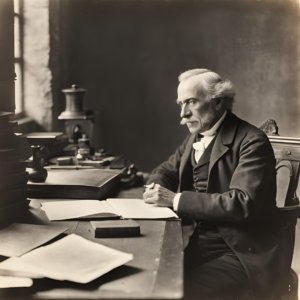
The Role Of Technology In Deaf Education
Assistive technology in deaf education has revolutionized learning. These tools make communication easier for deaf students. They also help teachers deliver lessons more effectively.
Some key technologies include:
- Hearing aids: These devices amplify sound, helping students hear better.
- Cochlear implants: These surgically implanted devices provide a sense of sound.
- Video relay services: These allow deaf individuals to communicate over the phone using sign language.
- Real-time captioning: This provides instant text of spoken words, useful in classrooms and meetings.
Tablets and computers also play a big role. They offer apps that teach sign language. They also provide interactive lessons, making learning fun and engaging.
| Technology | Purpose |
|---|---|
| Hearing Aids | Amplify sound |
| Cochlear Implants | Provide a sense of sound |
| Video Relay Services | Enable phone communication |
| Real-time Captioning | Instant text of spoken words |
These technologies make education more accessible. They help bridge the gap between deaf and hearing students. With these tools, deaf students can achieve their full potential.
Ferdinand Berthier’s Legacy In Deaf Advocacy And Beyond
Ferdinand Berthier was a trailblazer in the field of deaf education and advocacy. His work laid the groundwork for future generations, making education accessible to the deaf community. Berthier’s efforts in deaf advocacy have left an indelible mark on society. He fought tirelessly for the rights and recognition of the deaf community, ensuring their voices were heard. This section delves into Ferdinand Berthier’s legacy in deaf advocacy and beyond.
Recognition And Honors
Ferdinand Berthier’s contributions did not go unnoticed. He received numerous recognitions and honors for his work in deaf education and advocacy. Berthier’s influence on modern advocacy is profound, and his efforts were celebrated in various ways:
- French Academy of Sciences: Berthier was awarded by this prestigious institution for his groundbreaking work in deaf education.
- Medals and Awards: He received several medals, including the Legion of Honor, for his advocacy efforts.
- Institutions Named After Him: Schools and organizations for the deaf have been named in his honor, commemorating his contributions.
Berthier was also a prolific writer, publishing numerous works on deaf education. His writings continue to inspire educators and advocates today. He organized the first congress of deaf-mutes in Paris in 1834. This event was a milestone in the history of deaf advocacy, bringing together deaf individuals from across Europe.
Berthier’s home in Louhans, France, has been preserved as a historical site. Visitors can learn about his life and legacy, further honoring Ferdinand Berthier. His achievements are a testament to his dedication and passion for deaf education and advocacy.
Continuing The Legacy
Ferdinand Berthier’s legacy in deaf advocacy lives on. Modern advocates and educators draw inspiration from his work. Berthier’s influence on modern advocacy is evident in various aspects:
- Educational Programs: Many schools for the deaf incorporate Berthier’s methods and philosophies into their curricula.
- Advocacy Groups: Organizations like the World Federation of the Deaf continue Berthier’s mission of advocating for the rights of the deaf community.
- Legislative Changes: Laws and policies have been influenced by Berthier’s work, ensuring better accessibility and rights for the deaf.
Advocates today continue to fight for equality, drawing on Berthier’s strategies and insights. Educational institutions hold events and workshops to honor Berthier’s influence on modern advocacy. These events keep his legacy alive and relevant.
Berthier’s dedication to deaf education pioneers a path for future generations. His work serves as a foundation for continued efforts in deaf advocacy. Honoring Ferdinand Berthier involves recognizing his contributions and continuing to build on his legacy.
In summary, Ferdinand Berthier’s legacy in deaf advocacy and beyond is a beacon of inspiration. His work continues to shape the field of deaf education and advocacy, ensuring a brighter future for the deaf community.
The Lasting Impact Of Ferdinand Berthier
Ferdinand Berthier was a pioneer of deaf education whose work has left a lasting impact. His efforts in advocating for the deaf community and promoting sign language education have shaped the way we understand and support deaf individuals today. This section explores his enduring legacy and the importance of his contributions.
Summing Up His Contributions
Ferdinand Berthier made numerous contributions to the deaf community. His work in education and advocacy created a foundation for modern deaf rights. Some of his key achievements include:
- Advocating for Sign Language: Berthier emphasized the importance of sign language in education. He believed it was crucial for effective communication and learning among the deaf.
- Founding Deaf Organizations: He established several organizations for the deaf. These groups provided support, education, and a sense of community.
- Writing and Teaching: Berthier authored many books and papers. His writings highlighted the need for better educational resources for the deaf.
- Promoting Deaf Culture: He worked to preserve and promote deaf culture. He believed that the deaf community had a rich cultural heritage worth celebrating.
Berthier’s advocacy led to significant improvements in deaf education and rights. His work laid the groundwork for future advancements in these areas.
Call To Further Study And Recognition
The impact of Ferdinand Berthier on sign language education and deaf rights is immense. Yet, his contributions are often overlooked. There is a need for further study and recognition of his work.
- Research: More research is needed to fully understand Berthier’s impact. Scholars should explore his writings and the organizations he founded.
- Education: Schools and universities should include Berthier’s work in their curriculum. This will help new generations appreciate his contributions.
- Public Awareness: Public awareness campaigns can highlight Berthier’s lasting contributions to deaf rights. This can be done through documentaries, articles, and social media.
By studying and recognizing Ferdinand Berthier’s work, we can ensure his legacy endures. This will not only honor his memory but also inspire continued progress in deaf education and rights.
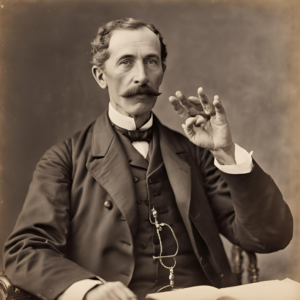
Answering User Queries:
Ferdinand Berthier was a remarkable figure in the history of deaf education. His contributions have had a lasting impact on the deaf community. In this section, we will answer user queries about his role and significance. We will explore his contributions, his significance to the deaf community, and how he promoted French Sign Language.
What Did Ferdinand Berthier Contribute To Deaf Education?
Ferdinand Berthier made several key contributions to deaf education. He was a pioneer who worked tirelessly to improve the lives of deaf individuals. Here are some of his notable contributions:
- Founding Deaf Institutions: Berthier established schools and organizations for the deaf. These institutions provided education and support.
- Advocacy: He advocated for the rights of deaf people. He fought for their recognition and inclusion in society.
- Publishing: Berthier published many works on deaf education. His writings helped spread awareness and knowledge.
- Teacher Training: He trained many teachers in methods of deaf education. This ensured quality education for deaf students.
Berthier’s work laid the foundation for modern deaf education. His efforts ensured that deaf individuals received the education they deserved.
Why Is Ferdinand Berthier Significant To The Deaf Community?
Ferdinand Berthier holds a special place in the heart of the deaf community. His significance stems from his relentless advocacy and dedication. Here are some reasons why he is so important:
- Role Model: Berthier was a successful deaf individual. He showed that deaf people can achieve great things.
- Empowerment: He empowered deaf individuals. He encouraged them to take pride in their identity and culture.
- Community Building: Berthier helped build a strong deaf community. He brought people together and fostered a sense of belonging.
- Legacy: His legacy lives on in the institutions and organizations he founded. They continue to support and educate deaf individuals today.
Berthier’s contributions have had a lasting impact. He is remembered and celebrated as a hero in the deaf community.
How Did Ferdinand Berthier Promote French Sign Language?
Ferdinand Berthier was a strong advocate for French Sign Language (LSF). He recognized its importance for communication and education. Here are some ways he promoted LSF:
- Educational Use: Berthier used LSF in his teaching. He believed it was essential for effective education.
- Publications: He wrote about LSF in his publications. His works highlighted its importance and benefits.
- Advocacy: Berthier advocated for the recognition of LSF. He worked to ensure it was respected and valued.
- Teacher Training: He trained teachers to use LSF. This ensured that future generations would continue to use and teach the language.
Berthier’s efforts helped establish LSF as a respected language. His work ensured that deaf individuals could communicate and learn effectively.
Who Was Ferdinand Berthier?
Ferdinand Berthier was a 19th-century French educator and advocate for the deaf. He significantly contributed to deaf education and culture.
What Are Berthier’s Key Contributions?
Berthier founded the first organization for deaf people, promoted sign language, and advocated for deaf rights. His work laid the foundation for modern deaf education.
Why Is Ferdinand Berthier Important?
Berthier is important for advancing deaf education and advocating for the use of sign language. His efforts empowered the deaf community.
How Did Berthier Impact Deaf Education?
Berthier’s methods improved deaf education by emphasizing sign language and creating supportive institutions. His work influenced future educational practices.
Conclusion
Ferdinand Berthier’s legacy in deaf education remains impactful. His work paved the way for modern teaching methods. Educators continue to draw inspiration from his achievements. Understanding his contributions helps us appreciate the progress in deaf education. Berthier’s dedication ensures that his influence will be felt for generations to come.
